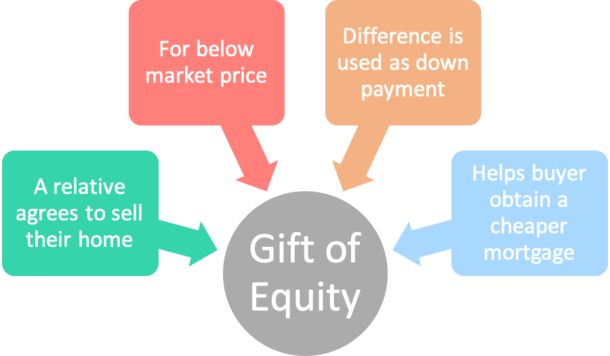One of the biggest hurdles to homeownership is down payment.
Most people can afford a monthly mortgage payment, especially with interest rates so low, because it’s often not too different than a rent payment.
But coming up with 20% of the purchase price is a different story. Heck, most Americans don’t even have a couple month’s reserves in their bank account.
And while there are several zero down mortgage options like USDA loans and VA loans, and low down payment mortgage programs like FHA loans and Fannie Mae HomeReady, you pay more when you put less down.
Simply put, the more risk you present to the lender, the more you pay, whether it’s through mortgage insurance or a higher mortgage rate.
To alleviate this concern, you could look into a “gift of equity,” which as the name implies, is a contribution of equity from the seller to the buyer that can be used toward down payment on a home purchase.
How a Gift of Equity Works

- A relative agrees to sell their home at below-market value
- The difference between appraised value and loan amount is the gift
- Can be used for down payment and closing costs
- Allows buyer to avoid PMI and obtain a cheaper mortgage via lower interest rate
In short, it’s a “gift” provided by the home seller to the property buyer that works like a credit, which can be used toward the down payment and closing costs.
Instead of selling the property at market price, the seller agrees to a lower sales price, with the difference between the appraised value the gifted equity.
This allows our hypothetical home buyer to instantly acquire equity and take out a mortgage for the remaining balance, which could be just 80% of the purchase price.
As such, they can avoid costly mortgage insurance and obtain a lower mortgage rate thanks to a lower loan-to-value ratio (LTV).
Gift of Equity Example
- Home is valued at $400,000 per verified appraisal
- Parents agree to gift their child $80,000 in equity
- Child takes out $320,000 home loan
- Instantly has 20% in home equity
Let’s pretend your parents own a home that they’re ready to move out of due to retirement and a desire to downsize.
They’ve always wanted to give it to their child, but it’s out of their price range, at least from a down payment perspective.
Instead of merely handing over the keys, they can provide a gift of equity to their child by selling it for a lower-than-market price.
An appraisal reveals the home is worth $400,000 today, but the parents are willing to provide their daughter with $80,000 in gifted equity.
Effectively, the home is being sold for $320,000, meaning the parents will walk away with lower proceeds once the loan funds.
However, because the property appraises for $400,000, their daughter can take out a $320,000 mortgage and instantly acquire 20% equity.
As a result, the mortgage would be priced at 80% LTV, low enough to avoid mortgage insurance and obtain a more competitive mortgage rate.
It’s a win-win for all parties involved and clears that pesky down payment hurdle that often blocks the American Dream.
Gift of Equity Rules and Requirements
- You must provide a gift letter that indicates it’s a gift
- Relationship between buyer and seller must be disclosed
- Minimum borrower contribution requirements apply to gifts of equity
- Down payment aside, you must qualify for the mortgage
Now there are some rules one must follow in order to utilize a gift of equity.
First and foremost, you’ll need a signed gift letter that indicates it is indeed a gift.
Similar to gift funds, it can’t be a loan masquerading as a gift. It shouldn’t and doesn’t need to be paid back to the donor.
Why? Because it’s a gift! So make sure you and the donor have that part clear.
Next, the relationship between donor and recipient must also be disclosed and included in the loan file.
It should be a relative, defined as a spouse, child, dependent, or any other individual related by blood, marriage, adoption, or legal guardianship. May also include a fiancé, fiancée, or domestic partner.
A gift of equity can be used on a primary residence or a second home, but no investment properties allowed.
If the LTV is greater than 80% and it’s a 2-4 unit primary residence or a second home, a minimum borrower contribution of 5% must come their own funds.
In other words, yet another good reason to keep the LTV at or below 80%, something that should be feasible when gifting equity.
You also need to otherwise qualify for a mortgage in order for all this to work.
Lastly, the gift of equity must be transferred directly from the donor’s account to the borrower’s account, or to the settlement/closing agent, and also be reflected on the closing/settlement statement.
Be sure to consider the tax implications of the gift as well – the donor should speak to an advisor if necessary. And the recipient must be careful not to sell too quickly to avoid costly capital gains.
(photo: Larry Koester)
- Will Mortgage Rates Be Higher or Lower by the End of 2025? I Asked AI. - July 2, 2025
- Rocket Mortgage Completes Redfin Takeover, Offers $6,000 Home Buyer Credit - July 1, 2025
- Mortgage Rates Quietly Fall to Lows of 2025 - June 30, 2025

